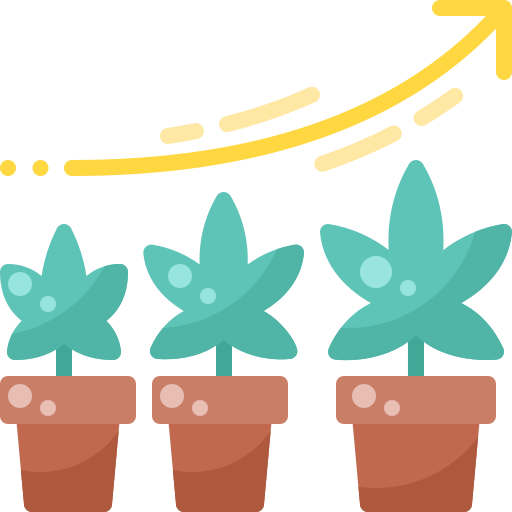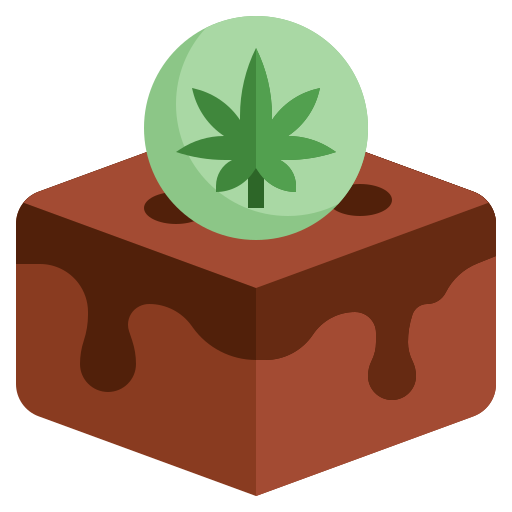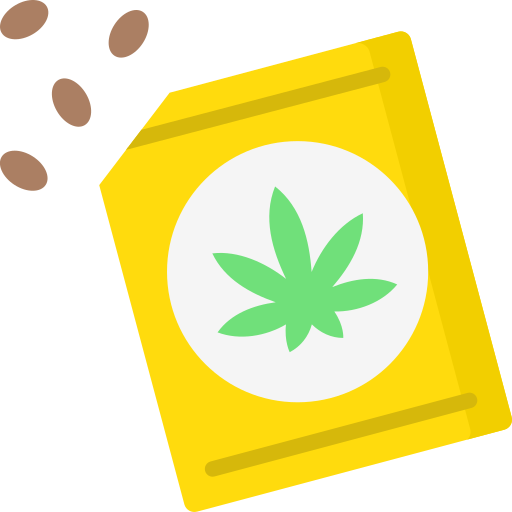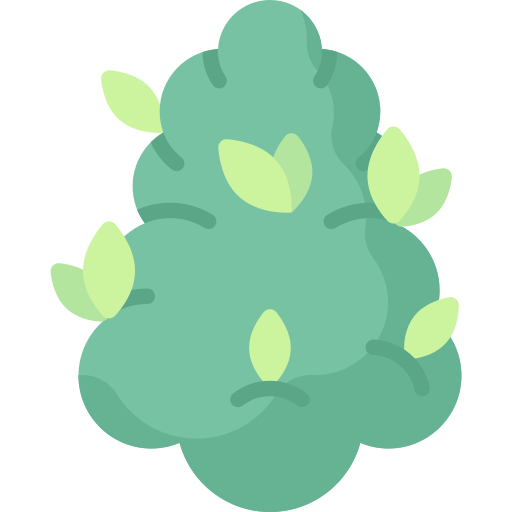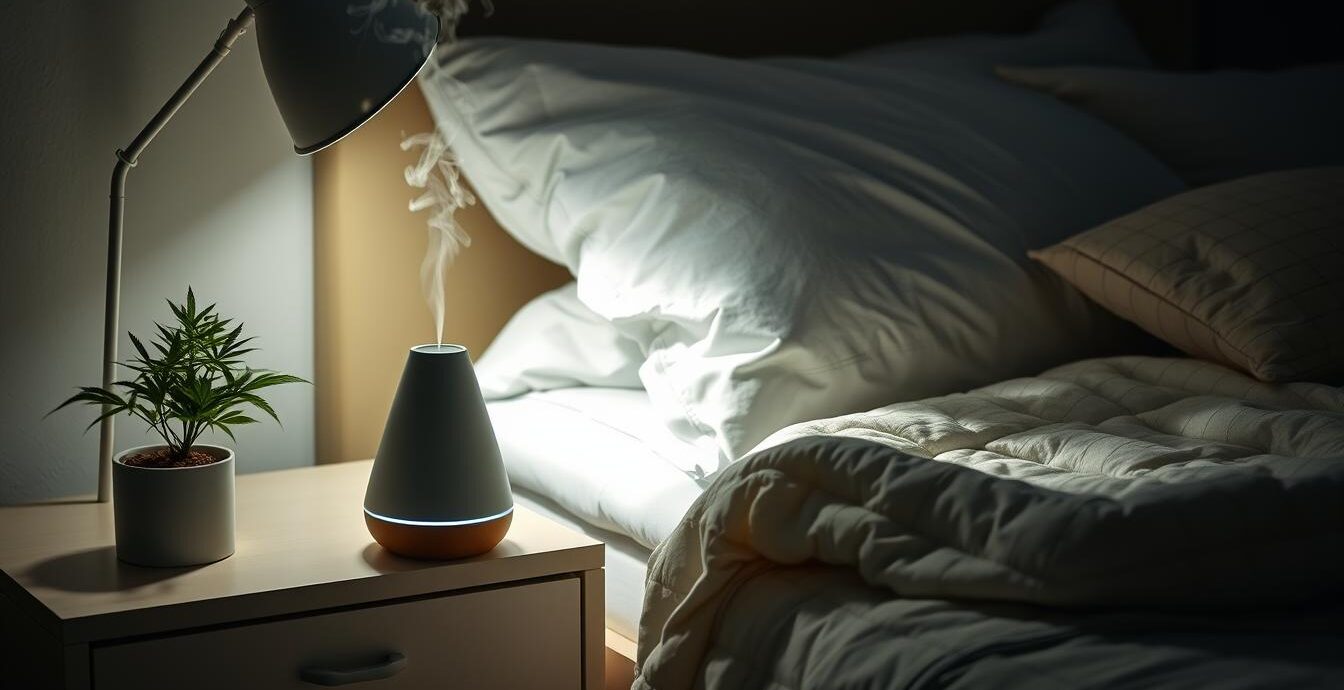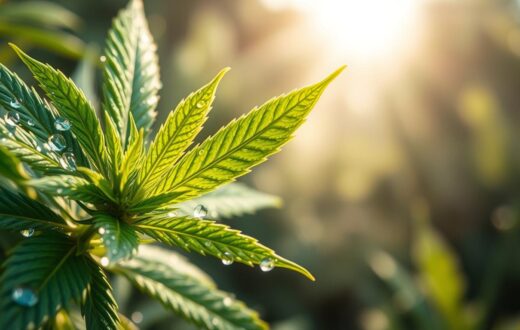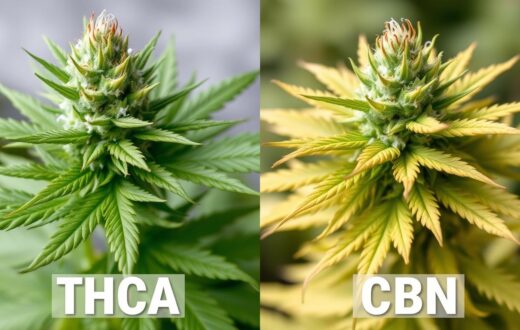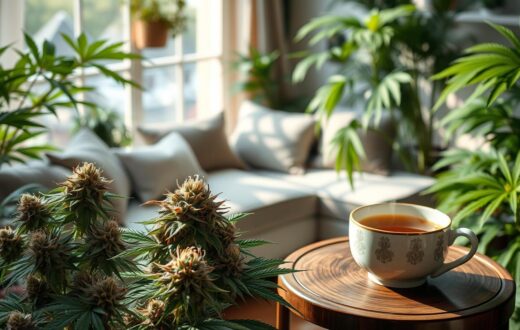Are you tossing and turning at night, searching for a natural sleep fix? You’re not alone. Up to 30% of people worldwide struggle with sleep. But, there’s hope: THCA, a compound in raw cannabis, might help you sleep better.
THCA for sleep is becoming a promising solution. Unlike THC, it won’t make you high. Instead, it offers benefits that could help you sleep more soundly.
Research suggests THCA can improve sleep quality. This natural remedy might help you fall asleep faster and sleep through the night. It’s not just about how long you sleep, but how well you sleep too.
So, how does it work? THCA interacts with your body’s endocannabinoid system. This could ease anxiety and stress, common sleep disruptors. It might also help manage pain and inflammation, addressing issues that keep you awake.
Interested in trying THCA for sleep? Stay tuned for more on this topic. We’ll look into how THCA differs from other cannabinoids, the science behind its sleep benefits, and how to use it in your bedtime routine.
What is THCA?
THCA stands for tetrahydrocannabinolic acid. It’s a non-intoxicating compound found in raw cannabis plants. It’s the precursor to THC, the psychoactive part of marijuana. Knowing the difference between thca vs thc is key for those looking into cannabinoid sleep aids.
Definition and Overview
THCA is found in fresh cannabis and works with our body’s endocannabinoid system. Unlike THC, it doesn’t make you feel “high” when raw. THCA flowers can have up to 40% of this compound, offering potential health benefits.
How THCA Differs from THC
THCA and THC have different structures and effects. THCA turns into THC when heated, a process called decarboxylation. About 87.7% of THCA becomes THC when smoked.
THC can cause anxiety and memory problems. But THCA, in its raw form, might make you feel a bit sleepy without the “high” THC gives. This makes THCA a good choice for those looking for a sleep aid without THC’s effects.
The Science Behind THCA and Sleep
Sleep is vital for our health, but many adults in the US don’t get enough. Over a third of adults don’t get the 7 hours they need each night. This has led many to look for new ways to sleep better, including cannabis compounds like THCA. Learning about THCA and sleep can help us understand its benefits.
How Cannabinoids Affect Sleep Quality
Cannabinoids, like THCA, play a big role in how we sleep. They are linked to our body’s natural sleep cycle. A study found that 80% of cannabis users with sleep problems felt it helped them relax and sleep better.
Interestingly, 63% of these users slept 6-8 hours when using cannabis alone. This is more than those using sleep meds alone or with cannabis.
The Endocannabinoid System and Sleep
The endocannabinoid system is crucial for understanding how THCA affects sleep. It controls our body’s functions, including when we sleep and wake. Cannabis terpenes also play a role in sleep.
Terpenes like myrcene and linalool, found in cannabis, help us relax and sleep. Myrcene, for example, makes a strain feel more indica, which is relaxing. This shows how cannabis compounds can improve sleep quality for those who struggle.
Potential Benefits of THCA for Sleep
THCA might help with sleep issues. It could improve sleep quality for those with insomnia and other sleep problems. Let’s see how THCA could help you sleep better.
Reducing Insomnia and Sleep Disruptions
THCA is seen as a solution for insomnia. It may ease sleep disruptions caused by chronic pain or arthritis. By reducing inflammation, THCA could help you sleep more soundly.
People say THCA-rich products help them fall asleep faster and sleep longer. This could be a game-changer for your sleep.
Alleviating Anxiety and Stress Before Bed
THCA might help with sleep by boosting serotonin. This can calm your mind and reduce anxiety before bed. Unlike THC, THCA doesn’t make you feel high, making it safe for sleep.
Research is still in its early stages, but THCA looks promising. It could be a natural way to overcome sleep barriers and wake up feeling refreshed.
THCA vs. Other Cannabinoids for Sleep
THCA, CBD, and THC are all used for sleep. Each has its own benefits. Knowing the differences can help you pick the best one for sleep.
Comparing THCA, CBD, and THC
THCA is found in raw cannabis and doesn’t make you high. CBD is calming but doesn’t get you high either. THC, however, is psychoactive and can cause anxiety in some.
When looking at THCA vs CBD for sleep, both are good choices. They offer benefits without the high from THC.
Efficacy and Bioavailability of THCA
THCA’s sleep benefits are still being studied. It may help with inflammation and protect the brain. It’s most effective in raw cannabis, as heat turns it into THC.
This means eating THCA raw keeps its benefits. More research is needed, but many find THCA helps with sleep without THC’s side effects.
Choosing between THCA, CBD, and THC for sleep depends on what you need. THCA is a good choice for natural sleep help without getting high. As research goes on, we’ll learn more about THCA’s sleep benefits.
Delivery Methods for THCA
THCA for sleep comes in various forms. You can take it in different ways, each with its own benefits. Let’s look at some popular methods to use THCA as a sleep aid.
Raw Cannabis Consumption
Eating fresh cannabis buds or juicing raw plant material keeps THCA non-psychoactive. This way, you can enjoy THCA’s sleep benefits without THC’s high. Raw cannabis keeps the plant’s balanced cannabinoid profile, which may help with the entourage effect.
THCA Oils and Tinctures
THCA oils and tinctures are easy to use for sleep. They offer precise dosing and are simple to take. Just place a few drops under your tongue for quick absorption. THCA oils have high bioavailability, meaning your body can use more of the compound effectively.
When shopping for THCA products, choose from licensed growers. Also, check for lab testing to ensure quality and potency. Remember, THCA is sensitive to heat. Avoid high temperatures to keep its sleep-promoting properties. Whether you choose raw cannabis or THCA oils, both can be effective as a natural sleep remedy with THCA.
Recommended Dosage of THCA for Sleep
Finding the right thca dosage for better sleep can be tricky. Everyone’s body reacts differently to cannabinoids. We’ll explore how to start using thca for sleep and what factors affect your ideal dose.
Starting Dosage and Adjustments
When using thca for sleep, start low and go slow. Begin with 1-2 milligrams per day. This allows your body to adjust gradually. If needed, increase your dose bit by bit.
Some people find 5-10 milligrams works best for sleep issues. Keep track of how you feel at different doses.
Individual Factors to Consider
Your ideal thca dosage for better sleep depends on several things. Body weight, metabolism, and tolerance all play a role. The severity of your sleep problems matters too.
Some folks are more sensitive to cannabinoids than others. Health conditions and medications can also affect how thca works in your body. It’s smart to talk to a doctor before trying thca for sleep, especially if you take other meds.
Remember, thca products come in different forms. Tinctures, capsules, and raw cannabis all have unique absorption rates. This impacts how much you need for good sleep.
Start with the lowest dose possible and adjust as needed. With patience, you’ll find the right amount of thca to help you catch those Z’s.
Side Effects of THCA
THCA for sleep is getting attention as a natural sleep aid. It’s important to know its possible side effects. THCA, found in raw cannabis, has different effects than THC.
Possible Reactions
THCA side effects are usually milder than THC. People might feel drowsy, have dry mouth, or changes in appetite. Some might feel dizzy, but this is rare.
THCA can also change blood pressure. Long-term use might affect memory and concentration.
Comparing with Other Sleep Aids
Unlike traditional sleep meds, THCA doesn’t usually cause dependency. It doesn’t make you feel high like THC. But, smoking THCA can harm your lungs.
Using raw cannabis or vaporizers might be safer for sleep. THCA is promising for sleep, but use it carefully. Pregnant women and those with health issues should be cautious.
Always talk to a doctor before adding THCA to your sleep routine.
Legal Status of THCA
The laws about THCA, a sleep aid, are complex and change in the U.S. THCA’s legal status depends on where it comes from and how much is in it. The 2018 Farm Bill made hemp products legal, but with certain rules.
Cannabinoid Regulations in the United States
Under federal law, THCA products are okay if they have less than 0.3% THC by dry weight. This rule is for THCA made from hemp. The 2023 Farm Bill was meant to clear up rules on psychoactive hemp, but it’s still pending. State laws also play a big role in THCA’s legal status.
State and Federal Laws Affect Access
States like California, Colorado, and Florida have their own rules for THCA. Some allow it if it’s from hemp and follows federal limits. Others have stricter rules. This mix of laws makes it hard to get and use THCA for sleep.
Before using THCA products, it’s important to check local laws. The rules around this sleep aid are still changing. This affects how easy it is to get and study THCA.
User Experiences with THCA for Sleep
Many people have trouble sleeping, and THCA might help. People say THCA makes them fall asleep faster and sleep better.
Anecdotal Evidence and Testimonials
Many have shared how THCA improved their sleep. They say it works better than regular sleep aids. It helps with anxiety and pain that can keep you awake.
“THCA has changed my life,” one user said. “I sleep faster and wake up feeling great.”
What the Research Says
Research on THCA and sleep is still in its early stages. Studies on cannabinoids show mixed results. But, some studies suggest THCA could help with chronic pain and inflammation, which can disrupt sleep.
When thinking about using THCA for sleep, remember everyone’s experience is different. Some feel its effects right away, while others prefer it in edible form. Always talk to a doctor before trying THCA for sleep.
THCA for Different Sleep Disorders
Sleep disorders are common, affecting 10-30% of people worldwide. THCA for sleep is showing promise in treating these issues. Let’s look at how it might help with different conditions.
Insomnia
THCA is being studied for insomnia relief. It’s a non-psychoactive part of raw cannabis. Unlike THC, it doesn’t cause a “high” that can disrupt sleep.
People say it makes them feel relaxed but without anxiety or paranoia. This is a big plus for those struggling with sleep.
Sleep Apnea and Other Conditions
Research on THCA for sleep apnea is still in its early stages. But cannabinoids might help manage this condition. THCA’s anti-inflammatory effects could aid in sleep-related breathing issues.
For those with chronic pain, THCA’s soothing effects could offer relief. It might also help with restless leg syndrome by calming the body.
Remember, THCA needs heat to turn into THC. So, eating raw cannabis or THCA-rich products keeps it non-psychoactive. This makes THCA a good choice for sleep aid without the psychoactive effects. As studies go on, we’ll learn more about THCA’s benefits for sleep disorders.
Combining THCA with Other Sleep Aids
THCA is a natural sleep remedy that can be used with other sleep aids. It helps with sleep issues, but knowing how it works with other options is important. Let’s explore natural supplements and prescription drugs that you might use with THCA.
Natural Supplements
Many people use THCA with natural sleep helpers. Melatonin, a hormone that helps set sleep cycles, is a common choice. Valerian root and magnesium are also favorites. These combinations might improve sleep quality.
But, everyone’s body is different. Start with small amounts of each to find what works best for you.
Prescription Medications
Mixing THCA with prescription sleep drugs requires caution. We don’t know much about how they interact. Sleep meds can make you drowsy, and THCA might add to this effect.
This combination could be risky. Always talk to your doctor before mixing THCA with any sleep drugs. They can guide you on safe use and possible side effects.
Remember, THCA for sleep is still new. We need more research to fully understand how it works with other sleep aids. Stay safe by starting slow and checking with a health pro. They can help you find the best mix for your sleep needs.
Quality and Sourcing of THCA Products
When searching for a sleep aid, high-quality THCA products are essential. The market has many choices, but not all are the same. Knowing what to look for is key to getting the best THCA for sleep.
Choosing High-Quality THCA
Quality begins with the source. Opt for products from premium cannabis plants. For instance, some companies use top-grade plants for their THCA gummies. These gummies usually have about 5mg of THCA per piece.
When shopping, make sure the product label clearly states the THCA content.
Importance of Lab Testing
Lab testing is vital for THCA products. Third-party lab results confirm the product’s strength and purity. They also check for harmful substances like pesticides or heavy metals.
Always choose brands that make their lab reports easily accessible. This ensures you get a safe and effective THCA sleep aid.
Remember, proper storage can keep THCA products good for up to two years. Start with a low dose of THCA for sleep and adjust as needed. This helps you find the right amount for better sleep without side effects. By picking quality products and using them correctly, you can fully benefit from THCA’s sleep benefits.
Future Research on THCA and Sleep
Research on THCA for sleep is very promising. Scientists are excited to see how it can improve sleep quality. Even though studies are still in the early stages, the outlook is bright.
Areas Needing Further Study
Researchers are interested in how THCA impacts different sleep stages. They also want to know its long-term effects and the best dosage. It’s important to compare THCA with other sleep aids.
They also aim to find out if THCA can help with sleep disorders. This knowledge could lead to better treatments.
Potential Innovations in THCA Formulations
New ways to use THCA for sleep are being explored. Time-release products could provide continuous support throughout the night. Mixing THCA with other compounds might enhance its benefits.
Scientists are also focusing on better delivery methods. These advancements could make THCA a top choice for natural sleep solutions.
Expert Opinions on THCA for Sleep
THCA for sleep is getting attention as a possible help for sleep. Experts in cannabis and sleep medicine share their views. Their opinions are helpful for those thinking about using THCA for sleep.
Insights from Cannabis Researchers
Cannabis researchers say THCA is a key part of raw hemp and cannabis leaves. It’s different from THC because it doesn’t make you high unless heated. They think THCA might help with sleep because it’s anti-inflammatory.
They also say THCA works with CB2 receptors. This could help you sleep better and relax your body.
Perspectives from Sleep Professionals
Sleep experts warn about using THCA for sleep. They say it’s not a substitute for good sleep habits. They think it’s important to find what works best for each person.
They suggest looking at your health and sleep problems before trying THCA. This way, you can see if it’s right for you.
Experts from both fields say we need more research on THCA for sleep. They point out that cannabis use can affect sleep differently for everyone. Some people might sleep too little or too much.
They advise talking to a healthcare provider before trying THCA or any sleep aid. This is because more research is needed.
THCA Consumption Guidelines
THCA, a key cannabinoid in hemp, offers potential benefits for sleep. To use THCA for sleep effectively, it’s crucial to understand proper consumption methods and safety practices. This natural sleep remedy with THCA can be a game-changer for those seeking better rest.
Preparing THCA for Maximum Benefits
To get the most out of THCA for sleep, consume it in its raw form. This prevents conversion to THC, which occurs when heated. Try juicing raw cannabis leaves or using cold-pressed THCA oils. Start with a low dose and increase gradually based on your needs. Remember, everyone’s body reacts differently to cannabinoids.
Safety Precautions and Best Practices
When using THCA as a natural sleep remedy, follow these guidelines. Store THCA products in a cool, dark place to maintain potency. Be aware of potential drug interactions, especially if you’re taking other medications. Pregnant or breastfeeding individuals should avoid THCA use. Establish a consistent sleep schedule and create a relaxing bedtime routine to enhance THCA’s effects. Avoid screens before bed to promote better sleep quality.
By following these guidelines, you can safely explore THCA for sleep improvement. Always consult with a healthcare professional before starting any new sleep regimen, including THCA use. With proper care and attention, THCA may become a valuable tool in your quest for restful nights.
Conclusion: THCA as a Sleep Aid
As we conclude our look at THCA for sleep, it’s clear it holds great promise. This non-psychoactive cannabinoid is a new way to improve sleep without the high of traditional cannabis. It’s a unique option for those seeking better sleep.
Summarizing Benefits and Considerations
THCA may help with insomnia and sleep issues. It could also help with inflammation, like in arthritis, leading to better sleep. Unlike THC, THCA doesn’t cause tolerance or addiction, making it a good natural sleep aid.
But, we need more research on THCA. Early studies and personal stories are promising, but we need more to know its long-term effects and how well it works as a sleep aid.
Final Thoughts on Incorporating THCA
If you’re thinking about using THCA for sleep, start with small amounts and talk to a doctor first. THCA is found in raw cannabis but turns into THC when heated. This allows for different ways to use it, like raw cannabis or THCA oils. As interest in THCA grows, we’ll see more research and new products for better sleep.
